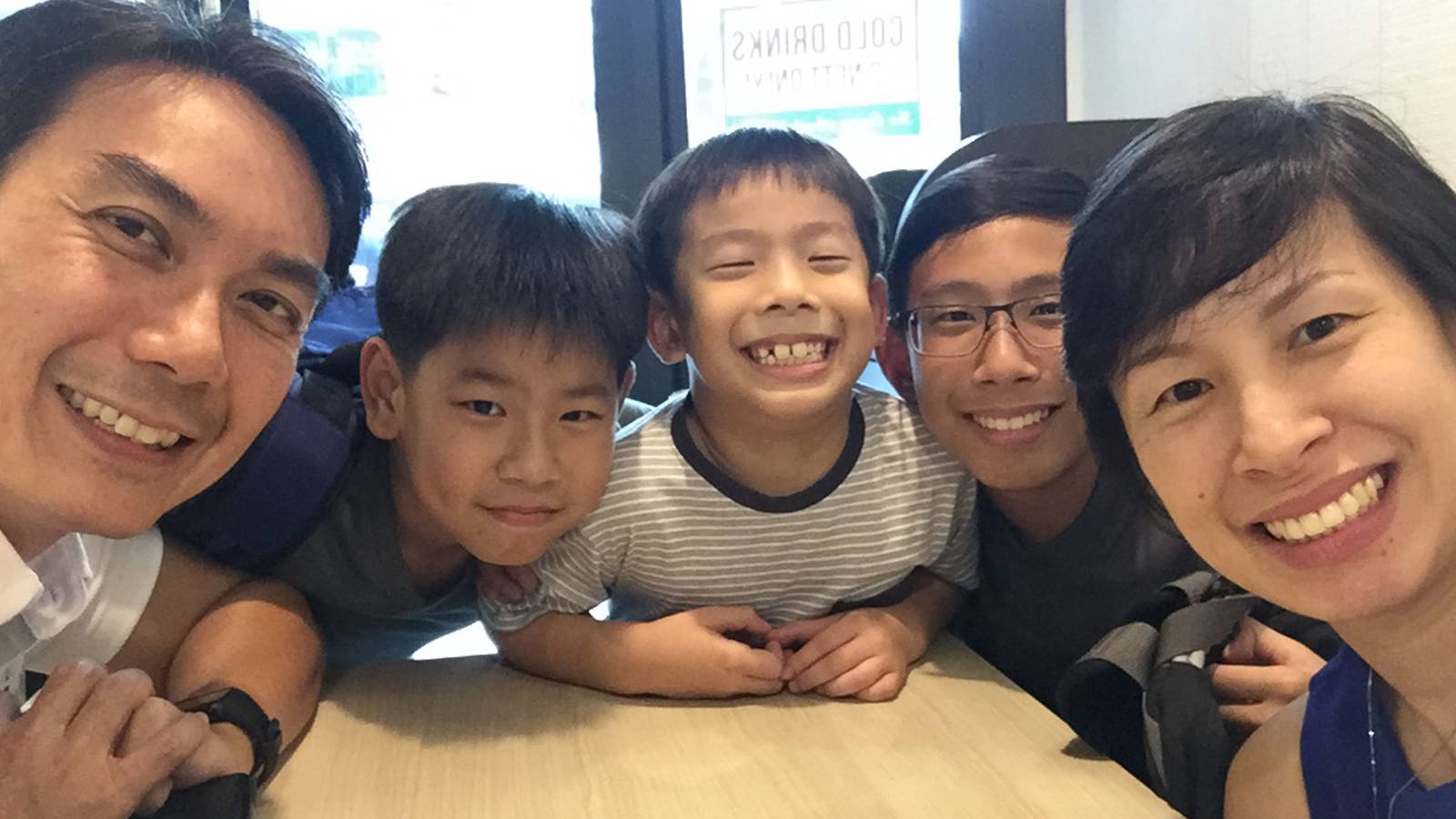Tina Tan describes her struggles raising a child who has ADHD, and how she helped him manage the condition.

“I have three sons. My oldest, Mark, is in Secondary 2. He loves drawing and reading and is a mature and sensitive boy who shows responsibility and great care for his brothers.
My second son, John is in Secondary 1 this year. He is very creative and often thinks out of the box. He loves programming and coding, as well as drawing and reading.
Our youngest, Paul, is in Primary 2. He’s a humorous little chap who often makes jokes and cracks the family up. He is very outgoing, loves playing outside and enjoys cycling. He also reads avidly and loves to draw, like his older brothers.
My boys, who have distinct personalities and differences, are very close to each other. Now that the two older ones have longer hours in secondary school, it’s very fun to watch all three of them reconnecting when they return after school. They have a lot to update and talk to each other about.
John, my second son, has Attention Deficit Hyperactivity Disorder (ADHD). He was also diagnosed with dyslexia and Asperger’s Syndrome, which is on the autism spectrum.
Besides being very hyperactive, I first noticed that John was struggling to learn to read when he was in preschool. So, in K2, at 6 years of age, I got him tested and he was diagnosed with dyslexia. Through the tests, he was found to also have ADHD.
In the initial years after he was diagnosed, he had all the symptoms: He was highly impulsive, often acting before thinking, highly distractible and extremely hyperactive. He had high anxiety ― he bit his finger nails and pencils regularly, had low communication skills, and was unable to maintain his attention and focus for long periods of time.
“He bit his finger nails and pencils regularly, had low communication skills, and was unable to maintain his attention and focus for long periods of time.”
I have a degree in psychology, so I knew a bit about ADHD. But I was also under the myth that it was more to do with parenting abilities, and how the parents were able to discipline the child. So, I didn’t focus much on it for a few months after his diagnosis.
Instead, we focused on his dyslexia and got him a personal tutor trained to help such children. He improved exponentially within a few months.
On the other hand, his ADHD symptoms started to affect his school life. He got into trouble with teachers in his kindergarten, and started to refuse to go to school. It was then that I realised that I had to find out more about ADHD and get support for him and myself in this journey.

Joh had frequent meltdowns and tantrums when he could not get his way; got into trouble with his classmates because he acted in anger, and hurt them even though he knew he should not; threw tantrums when he was told to start an activity he didn’t like, or stop an activity he loved.
ADHD children don’t know any better than being their ADHD selves. They don’t intentionally break the rules or disregard instructions.
It is a neuro-developmental condition where their executive function* is less mature than their peers. This is the part responsible for emotional regulation, working memory and organisational skills. When these don’t function well, the child acts younger than his age in terms of self-regulation.
It was a frequent struggle to manage him, especially in the early years. As a family, we didn’t get to interact freely with other families on social outings, because we were not sure if they’d accept our son with his ADHD symptoms, and be willing to work with us should anything happen between their children and ours. So, we mostly did things on our own and usually chose not to have joint family outings.
The strain of having an ADHD child in the family is tremendous. Everything you take for granted for your day to run smoothly can be hijacked at any moment by a strong refusal to follow instructions, insistence on doing things in their usual preferred manner, and their inability to remember daily instructions and rules. The list can go on.
“ADHD children don’t know any better than being their ADHD selves. They don’t intentionally break the rules or disregard instructions.”
Families like us face judgement frequently whenever he melts down in public ― there is a lot of criticism and a lack of empathy. There is so much strain and pressure on these young parents ― we’ve been there. Even relatives and extended family members can often be insensitive in their comments and advice.
Initially, I had just accepted his hyperactivity as very much a part of his personality. I was a bit dismissive, and thought that I had to just be firmer and stricter with respect to my discipline approaches with him.
Even though I had basic knowledge about learning and special-needs conditions, I still had the misconception ― this is very prevalent among parents and educators ― that ADHD is a label for children who haven’t been well disciplined at home.
It was not till I realised that managing him was a daily, frequent, endless battle that I admitted to myself that it was beyond my simple understanding. So, I sought to read up and find help.
* Executive functions are a set of processes that are linked to managing oneself and one’s resources in order to achieve a goal. These neurologically-based skills require mental control and self-regulation.

When I thought through it, I realised that ADHD symptoms are totally contrary to our Singapore classroom. Children in Singapore are required to ‘sit-down and listen’. I became aware that I needed to give him better support to adapt and do well in the school system.
As I have psychology and social-work training, I read up and we worked at home with him a lot. We attended a Pace programme by The Society for the Promotion of Attention-Deficit Hyperactivity Disorder Research & Knowledge (Spark), where I picked up practical tips about how to manage his behaviours.
I worked very closely with his school’s allied educator for special needs, and also requested yearly dialogues with his form teacher and PE teachers. This is so that any event that happened would be accurately handled by all parties with insights into his condition. They would be able to understand his limitations and yet hold him accountable for responsible behaviour.
”I realised that ADHD symptoms are totally contrary to our Singapore classroom. Children in Singapore are required to "sit-down and listen.”
When we revisited his diagnoses closer to PSLE, his ADHD symptoms were too well managed for him to score as ADHD. However, he had some socio-communication issues, which were a concern. A psychologist thought this might be because he was had Autism Spectrum Disorder. So, we explored that and he was diagnosed to have Asperger’s Syndrome.
John has since done very well in regulating himself better and having a better understanding of himself. Most people who meet him now can’t tell that he is ADHD. He is currently studying at the School of the Arts Singapore.
ADHD awareness in Singapore is definitely increasing and many schools are actively requesting talks to better manage these children.
The more teachers are willing to adapt their traditional expectations on how a child should behave in class, the more they will use creative and empowering methods of teaching, as compared to just “sit down and don’t move” instructions. Not only will the ADHD students benefit, all students will benefit.
A lot of ADHD children refuse to go to school because of issues with teachers. So, teachers are in the frontline and they have a great impact on the child’s perception of school and education.
It’s not easy to manage ADHD and special-needs children, and I have a lot of empathy for teachers in this respect. Even as a parent, I needed to overcome my misconceptions about ADHD and learn new skills.
Teachers, too, need to be equipped and be willing to put aside any misconceptions that prevent them from adapting themselves to better manage the ADHD children in their classes.
It’s my hope to increase awareness about ADHD, and that more skills training will be provided for those who teach and manage ADHD children.”
Tina Tan lives in Singapore with her husband Frankie, and sons, Paul, 8, John, 13, and Mark, 14.
Check out other dramatic true stories here.
Take a look at these reads, too…
CONVERSATIONS WITH… An Autism Therapist


